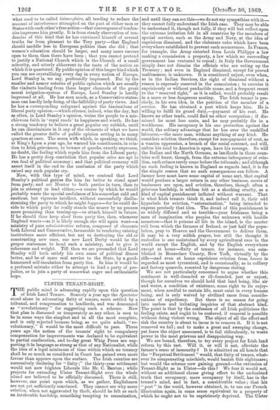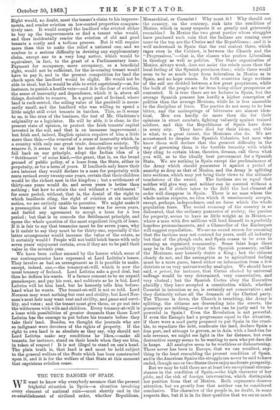ULSTER TENANT-RIGHT.
THE public mind is advancing rapidly upon this question of Irish Land Tenure. Scarcely a year ago the Spectator stood alone in advocating fixity of tenure, rents settled by a tribunal, and compensation to landlords, and was denounced as " revolutionary " for suggesting such a scheme. Now that plan is discussed as temperately as any other, is seen to be in some ways the simplest and in all the most complete, and is only rejected because being, as we quite admit, "re- volutionary," it would be the most difficult to pass. Three years ago the notion of the tenants' right to compulsory compensation for improvements was declared to be equivalent to partial confiscation, and to-day great Whig Peers are sup- porting it in language as strong as that of any Nationalist, while the idea of a legal minimum of time within which no tenancy shall be so much as considered in Court has gained even more favour than appears upon the surface. The Irish counties are successively declaring for " fixity ;" the thirty-year settlement would not now frighten Liberals like Mr. C. Buxton ; while projects for extending Ulster Tenant-Right over the whole island are believed to be officially discussed. There is still, however, one point upon which, as we gather, Englishmen are not yet sufficiently convinced. They cannot see why mere eviction, when not aggravated by theft, should be felt as such an intolerable hardship, something tempting to assassination, and until they can see this—we do not say sympathize with it— they cannot fully understand the Irish case. They may be able to understand it, though not fully, if they will but reflect upon the extreme irritation felt in all countries by the members of special services, such as the Army and Navy, at the idea of capricious dismissal, and the elaborate rules which have been everywhere established to prevent such occurrences. In France, for example, the Army extorted from Louis Philippe a law making a commission a property, a law which no succeeding government has ventured to repeal ; in Italy the Government simply dare not dismiss the officials who are eating up the Treasury ; and even in England dismissal, except for proved malfeasance, is unknown. It is considered unjust, even when,. as in the Indian Services, the right of dismissal without a reason is expressly reserved in the commission ; to exercise it capriciously or without producible cause, and a frequent resort- to the " reserved right," as it is called, would probably result in a more or less dangerous mutiny. The Irish tenant is pre- cisely, in his own idea, in the position of the member of a. service. He has obtained a post which keeps him. He is willing to fulfil its grand duty,—payment of his rent. He knows no other trade, could find no other occupation ; if dis- missed he must lose caste, and he may probably die in a. workhouse. His occupancy is his one protection against the world, the solitary advantage that he has over the unskilled labourer,—the mere man, without anything of any kind. He considers eviction therefore, except for non-payment of rent, as. a wanton oppression, a breach of the social contract, and will, unless his road to America is open, have his revenge. So will the Italian and the North German, as landlords in those coun- tries well know, though, from the extreme infrequency of evic- tion, such crimes rarely come before the tribunals ; and although no such feeling is known in England as regards land, it is for the simple reason that no such consequences can follow. A. farmer here must have some capital of some sort, that capital would produce a larger return in any other business, scores of businesses are open, and eviction, therefore, though often a grievous hardship, is seldom felt as a shocking cruelty, as a kind of capital punishment inflicted without warrant. That is what Irish tenants think it, and indeed call it, their odd_ hyperbole for eviction, "extermination," being intended to express precisely that idea. The dread of this punishment is so widely diffused and so terrible—your Irishman being a man of imagination who peoples the unknown with hostile monsters—that it poisons all life in the island, is the master evil from which the farmers of Ireland, or just half the popu- lation, pray to Heaven and the Government to deliver them. It may be a very selfish prayer, but still the thought it embodies is one maintained by every agricultural race in the world except the English, and by the English everywhere except at home—fixity of tenure, for instance, was esta- blished in Rensselaer County, New York, virtually by the rifle—and even at home capricious eviction from houses is• regarded as most tyrannical, and is occasionally, as in colliery and factory quarrels, resented by dangerous rioting.
We are not particularly concerned to argue whether this sentiment is well-founded or ill-founded, just or unjust, though for ourselves we should hold that land being, like air- and water, a condition of existence, some right to its enjoy- ment, when needful to sustain life, must exist in every human being, and is only waived by civilized races from conside- rations of expediency. But there is no reason for going- into useless and irritating inquiries of that abstract kind. The point is that by the confession of all Irish politicians the feeling exists, and ought to be renioved, if removal is possible without doing violent wrong. The object of all the effort and risk the country is about to incur is to remove,it. If it is not removed we fail ; and to make a great and sweeping change, yet leave the object unsecured, is to fail ridiculously, to waste power in the most grievous and disappointing way.
We are bound, therefore, to try every project for Irish land reform by this test. Will it, or will it not, alleviate the farmer's sense of insecurity ? It is admitted on all hands that the " Perpetual Settlement " would, that fixity of tenure, what- ever its compensating mischiefs, would banish this nightmare; but would the scheme now gaining ground—the extension of Tenant-Right as in Ulster—do this We fear it would not, without an additional clause giving effect to the undoubted truth that occupancy, mere occupancy by itself, has in the tenant's mind, and in fact, a considerable value ; that hia " post " in the world, however obtained, is, to use our French illustration again, in some sense equivalent to a property of which he ought not to be capriciously deprived. The Ulster Right would, no doubt, meet the tenant's claim to his improve- ments, and render eviction on low-rented properties compara- tively rare. It would compel the landlord who evicted either to buy up the improvements or find a tenant who would, and thus incidentally render the eviction of old and good tenants a costly and a tedious process. But it will require more than this to make the relief a national one, and we confess to a serious difficulty in devising any supplementary claim, except one to a very long notice, which would be equivalent, in fact, to the grant of a Parliamentary lease. Payment for occupancy, mere occupancy, as a beneficial right, would not be sufficient, for the in-coming tenant would have to pay it, and in the present competition for land the check upon the landlord would be slight. He would not be able to steal, but he would be able to evict capriciously—as, for instance, to punish a hostile vote—and it is the fear of eviction, the sense of insecurity and dependence, which it is, above all things, desirable to remove. In a great part of Ireland, where land is rack-rented, the selling value of the goodwill is neces- sarily small, and the landlord who was willing to spend a little might still evict tenants in batches. This, as it seems to us, is the crux of the business, the test of Mr. Gladstone's originality as a legislator. He will be able, it is clear, in the present state of opinion, to protect the Irish tenants' capital invested in the soil, and that is an immense improvement ; but Irish and, indeed, English opinion requires of him a little more than this,—the removal of a sense of insecurity which, in a country with only one great trade, demoralizes society. To remove it, it seems to us that he must directly or indirectly fall back on our principle, adopt the Indian idea of a " Settlement " of some kind,—the grant, that is, on the broad ground of public policy, of a lease from the State, either in perpetuity, or for a term of years. If landlords only knew their own interest they would declare to a man for perpetuity with rents revised every twenty-one years, certain that their children would be the richest men in the kingdom ; but a settlement of thirty-one years would do, and seven years is better than nothing ; but how to attain the end without a " settlement " for some period, without, that is, the denial of the right to which landlords cling, the right of eviction at six months' notice, we are entirely unable to perceive. We might make it a presumption of law that the tenancy was for seven years, and forbid any agreement to accept a lease for a less period ; but that is to concede the Settlement principle, and opens the whole question of the most expedient length of lease. If it is fair to say that tenancies must be for seven years, why is it unfair to say they must be for thirty-one, especially if the latter arrangement would increase the value of the estate, as it certainly would ? People will not build brick barns with only seven years' enjoyment certain, even if they are to be paid their value in the seventh year.
We have been rather amused by the horror which some of our contemporaries have expressed at Lord Leitrim's leases. They involve as bad an arrangement as it is possible to make, except, indeed, one,—the tenancy-at-will, which is now the usual tenancy of Ireland. Lord Leitrim asks a good deal, but then he defines his wants. If a farmer consent to be an unpaid gamekeeper, and pay his rent, and cultivate as he is bid, Lord Leitrim will let him land, but he honestly tells him before- hand what he wants. The tenant-at-will is not so told. Lord Norman may want nothing but rent and civility, but Lord Nor- man's next heir may want rent and civility, and game and servi- lity, and votes ; and the tenant must give them, or go out into the wilderness with wife and children. Every tenancy-at-will is a lease with possibilities of greater demands than those Lord Leitrim has the courage to put before his tenants before they take their land. Besides, we thought the journals who are so indignant were devotees of the rights of property. If the right to own land is as absolute as they say, why should not Lord Leitrim make any conditions he likes,—make all tenants, for instance, stand on their heads when they see him, in token of respect ? It is not illegal to stand on one's head. The plain truth is, that land is and must be held subject to the general welfare of the State which has been constructed upon it, and it is for the welfare of that State at this moment that capricious eviction cease.































 Previous page
Previous page